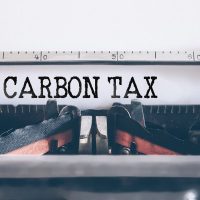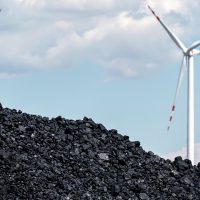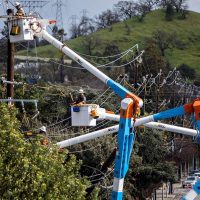Publication Year
2019

Social Comparison and Energy Conservation in a Collective Action Context
December 18, 2019
In this CEEPR Working Paper, the authors report results from a social comparison feedback experiment incentivizing a reduction of indoor temperatures during the heating season. Despite the fact that most study participants did not face direct financial benefits from lowering heating energy consumption, the results show a statistically significant treatment effect of -0.54°F (-1.2%).

Machine Learning for Solar Accessibility: Implications for Low-Income Solar Expansion and Profitability
December 10, 2019
The US solar industry typically uses a standard credit score as a factor in approving customers for new installations. The authors of this paper compare machine learning and econometric models to predict the probability of default to credit-score cutoffs.

Getting the carbon out of the electricity sector
December 9, 2019
CEEPR faculty members Paul Joskow, David Keith, Christopher Knittel and Jessika Trancik participated in a recent MIT symposium titled “Decarbonizing the Electricity Sector.”

Driving Behavior and the Price of Gasoline: Evidence from Fueling-Level Micro Data
November 14, 2019
In this CEEPR Working Paper, Professor Christopher Knittel and Professor Shinsuke Tanaka use novel microdata on on-road fuel consumption and prices paid for fuel to estimate short-run elasticities of demand for gasoline consumption.

Five reasons climate change is the worst environmental problem the world has ever faced
October 28, 2019
In an op-ed in the Los Angeles Times, Professor Christopher Knittel lays out five features that combine to make global warming a more vexing environmental crisis than any we have faced before.

Electrification Planning in Developing Countries
October 21, 2019
The studies presented in this CEEPR Working Paper employ the Reference Electrification Model (REM) to investigate the value of accurately modeling detailed demand characteristics for electrification planning endeavors. REM prescribes cost-optimal supply technology designs for large areas of interest at building-level granularities given information about existing infrastructure, supply technology, and demand characteristics.

Crackdowns in Hierarchies: Evidence from China’s Environmental Inspections
October 10, 2019
Professor Valerie Karplus and Mengying Wu investigate how ï¬rms respond to crackdowns on public policy enforcement by linking the timing of centralized dispatch of environmental inspectors to cities in China with high-frequency observations of air pollution at coal power plants.

Strengths and Weaknesses of Traditional Arrangements for Electricity Supply
October 1, 2019
Professor Richard Schmalensee provides a broad-brush comparison of performance under traditional arrangements for electricity supply with those that emerged after the world-wide wave of restructuring that began in the 1990s in a new CEEPR Working Paper.

Should the EU tax imported products according to their CO2 footprint?
September 24, 2019
In an op-ed on The Rift, CEEPR’s Emil Dimanchev outlined the pros of a carbon tax on imports in the EU, stating that pricing CO2 imports would be a win-win for the environment and the EU economy.

Providing the Spark: Impact of Financial Incentives on Battery Electric Vehicle Adoption
September 23, 2019
In a new CEEPR Working paper, researchers examine direct financial incentives for consumers that purchase battery electric vehicles. Their analysis estimates that state-level subsidies in the form of vehicle purchase rebates were responsible for an 11% increase in overall BEV registrations in the US from 2011 to 2015.

Estimating the Costs and Benefits of Fuel-Economy Standards
September 16, 2019
A team of researchers, including CEEPR Director Christopher Knittel, examine the welfare effects of fuel-economy standards and apply their analytical framework to the recent government proposal to roll them back. They find that the rollback proposal suffers from inconsistencies due to a piecemeal equilibrium analysis, which are highlighted in a new CEEPR Working Paper.

Advancing Towards Better Modeling Practices When Assessing the Value of Energy Storage in Long-term Energy Planning Studies
September 16, 2019
In a new journal article, CEEPR’s Andrés Inzunza and co-authors analyze how overlooking certain details in energy planning models may lead to an underestimation of the value of energy storage.

Diary of a Wimpy Carbon Tax: Carbon Taxes as Federal Climate Policy
September 11, 2019
In a new CEEPR Working Paper, Professor Christopher Knittel models the carbon price needed to achieve projected emission reductions under Obama-era vehicle mileage standards, the Clean Power Plan, and a biofuel mandate. He found that a federal carbon price of $7 in 2020 could reduce emissions by the same amount as all of the flagship climate policies adopted by the Obama administration.

Massachusetts needs congestion pricing now
August 12, 2019
In an Op-ed in the Boston Globe, CEEPR faculty member and MIT Sloan Mitsui Career Development Professor David Keith provides insights in response to MassDOT’s report on traffic congestion.

Implementing Negative Emissions Technologies
August 1, 2019
Negative emissions technologies (NETs) are increasingly looked to as a lever to achieve committed decarbonization goals. However, such technologies raise urgent technical questions around their risks, costs, and benefits. In a new CEEPR Working Paper, MIT Institute Professor John Deutch presents several options for the creation of a NET innovation program to promote their development and deployment, and discusses their implications.

Spatial and Temporal Variation in the Value of Solar Power across U.S. Electricity Markets
July 15, 2019
Researchers combine electricity prices, emissions rates, and weather data to map the changing value of PV at ~10,000 locations across the US. Cost declines are found to have outrun value declines, such that the energy, capacity, health, and climate benefits of PV outweigh utility-scale PV costs at the majority of locations modeled.

Decentralized Economic Dispatch for Radial Electric Distribution Systems
July 1, 2019
Innovative methods for dispatching power at the residential level must be explored as more DERs are entering the market. This CEEPR Working Paper explains how power dispatching works today, and introduces an alternative, decentralized method that accounts for DERs such as rooftop solar and electric vehicles.

MITEI awards seven Seed Fund grants for early-stage energy research
July 1, 2019
Namrata Kala and Christopher Knittel plan to examine key policy levers for meeting electricity demand and renewable energy growth without jeopardizing system reliability in the developing world.

Weakening the state’s renewable energy standards is bad for Ohioans’ health
June 29, 2019
In this commentary, CEEPR Senior Research Associate Emil Dimanchev discusses research on the effects of Ohio’s RPS on air quality and human health.

The Rise Of American Oil
June 28, 2019
On the Indicator, an NPR podcast show, Stacey Vanek Smith talks to Christopher Knittel, an economist at MIT, about what caused the turnaround in the oil dynamic between the US and OPEC, and what it means for the US and for the global economy.

On the Efficiency of Competitive Energy Storage
June 17, 2019
FERC recently issued Order 841, which is intended to open wholesale energy markets to merchant storage providers. In this Working Paper, Prof. Richard Schmalensee explores the validity of the Order’s presumption that existing markets will provide at least approx. optimal incentives for investment in both storage and generation: it does not contemplate the establishment of new markets or new policies.

Researchers: Bitcoin’s Carbon Footprint Equal to Las Vegas
June 13, 2019
In The New York Times, Christian Stoll discusses findings first published in a CEEPR Working Paper on the carbon footprint of virtual currency.

Millennials Like Cars As Much As Boomers Do
May 30, 2019
Christopher Knittel is P&Qs’ Professor of the Week. Everybody knows that Millennials marry later and buy fewer homes than previous generations did. But when it comes to cars, that conventional wisdom is wrong…

Optimal Commodity Taxation with a Non-renewable Resource
May 7, 2019
When governments need to raise public revenues, they should tax non-renewable resources more than regular commodities according to a dynamic rule. For carbon resources, that means augmenting the carbon tax in a way that further reduces their development and slows down their exploitation, which goes further in the direction of resolving the climate problem.

Why reducing carbon emissions from cars and trucks will be so hard
May 6, 2019
In this article on The Conversation, CEEPR faculty Professors David Keith and Christopher Knittel point out the difficulties facing the transition away from internal combustion engine vehicles.

State would benefit from preserving nuclear power
May 1, 2019
In an article on Press&Journal, John Parsons discusses a vital decision about the place nuclear power will have in Pennsylvania’s future.

E7: TIL about carbon pricing
April 25, 2019
In this episode of TILclimate (Today I Learned: Climate), MIT economics professor Christopher Knittel joins host Laur Hesse Fisher to break down the complexities of carbon pricing.

Shared Capacity and Levelized Cost with Application to Power-to-Gas Technology
April 16, 2019
Power-to-Gas could become a central enabler of the transition towards a sustainable economy by reversibly converting electricity to hydrogen. A new paper shows that it will be competitive with fossil-based energy sources so as to solve the challenges of intermittent renewable generation and widespread industrial decarbonization.

Generational Trends in Vehicle Ownership and Use: Are Millennials Any Different?
April 1, 2019
Professor Christopher Knittel and CEEPR graduate Elizabeth Murphy delve into the data to determine if conventional thinking regarding Millennials pans out. Their findings indicate there is little difference in preferences for vehicle ownership versus prior generations when controlling for confounding variables.

Don’t Expect Car Ownership to Become Obsolete
March 29, 2019
Christopher Knittel and Elizabeth Murphy’s recent work on millennial vehicle ownership trends are highlighted in this Economics Opinion piece on Bloomberg.

Earth Hour 2019: Turning off lights won’t save the planet but these ‘green’ actions will
March 29, 2019
In an article on Global.ca, a panel of experts, including Prof. Knittel, highlight choices one can make to reduce your carbon footprint.

Despite ‘Car-Free’ Hype, Millennials Drive a Lot
March 27, 2019
In this article on CityLab, reporter Laura Bliss discusses findings from a new working paper by CEEPR Director Christopher Knittel and recently graduated CEEPR Research Assistant Elizabeth Murphy.

Fuel-switching and Deep Decarbonization
March 15, 2019
Fuel-switching is inevitable to achieve deep decarbonization. This has, inter alia, prompted an increasing number of countries to announce coal phase-out mandates in the power sector. This working paper suggest that, when accounting for stranded assets, a decarbonization pathway that is based on gradual transition to renewable energy and initially retains coal generating assets turns out to be less expensive than a strict coal phase-out.

California wants to reform PG&E, but just how is uncertain
March 11, 2019
In this SF Chronicle article, a group of experts, including CEEPR Director Christopher Knittel, weigh in on some of the potential reforms and changes that PG&E may consider.

MIT CEEPR plays key role at first international carbon pricing research conference
March 7, 2019
CEEPR Deputy Director Michael Mehling serves as conference co-chair.

Competition for Electric Transmission Projects in the U.S.: FERC Order 1000
March 1, 2019
Professor Paul L. Joskow discusses the provisions of Order 1000, its application by ISOs, and examines the evidence to date regarding the development and application of the competitive transmission procurement model in the U.S in this CEEPR Working Paper.

Machine Learning from Schools about Energy Efficiency
February 19, 2019
This working paper studies the effectiveness of energy efficiency upgrades in K-12 schools, and demonstrate that the machine learning method outperforms standard panel fixed effects approaches. The authors find that the upgrades deliver only 53% of ex ante expected savings on average, and find a similarly low correlation between school-specific predictions of energy savings and realized savings.

The Efficiency and Distributional Effects of Alternative Residential Electricity Rate Designs
February 1, 2019
In this paper, researchers find that low-income customers would face bill increases on average in a transition to more economically efficient electricity tariffs. However, they demonstrate that simple changes to fixed charges in two-part tariffs can mitigate these disparities while preserving all, or the vast majority, of the efficiency gains.

Challenges for Wholesale Electricity Markets with Intermittent Renewable Generation at Scale: The U.S. Experience
January 11, 2019
A paper written by Professor Paul L. Joskow examines the current and likely future effects on wholesale electricity markets and the challenges these markets face due to the rapid expansion of intermittent (or variable) renewable energy, primarily wind and solar, with close to zero marginal generating costs.




